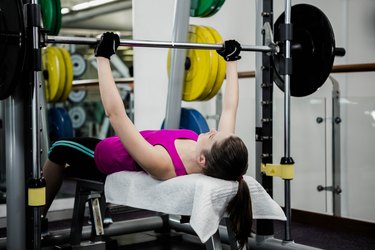
The bench press is an effective exercise for developing your chest, shoulder and triceps muscles, and for building upper-body strength. However, it also carries certain risks and can be detrimental to your shoulder health.
You may sometimes hear and feel a clicking in your shoulder when bench pressing, and when this happens, it is important that you know the cause and how to deal with it.
Video of the Day
Video of the Day
Read more: Chest Press vs. Bench Press
Clicking Shoulder and Bench Press
If your rotator cuff clicks during bench press, the most likely cause is a rotator cuff injury, according to University of Washington Medicine. The rotator cuff is a group of four small muscles that work together to support and stabilize your shoulder joint.
According to the Mayo Clinic, the rotator cuff muscles can become inflamed when subjected to repetitive pressing or overhead movements, such as bench presses, which can lead to them becoming trapped and cause shoulder clicking and pain.
If you have shoulder clicking but no pain, it is likely caused by tendons rolling over bony areas of your humerus, or upper arm bone.
Treatment for Shoulder Clicking
As soon as the clicking starts, cease bench pressing. To be on the safe side, you should also refrain from any weightlifting activities that involve moving your shoulder joint. Apply an ice pack to the area to reduce inflammation. Hold the ice pack on your shoulder for 20 minutes, several times per day for the first 24 to 48 hours after injury. Avoid any additional activities that increase your pain.
If your pain does not subside within a few days, see a doctor. Rotator cuff injuries are often successfully treated with physical therapy. Less commonly, surgery is required to repair one of the tendons if it is torn.
Use Good Form
Your bench-press technique may be contributing to your shoulder clicking, so when your shoulder heals, evaluate your form. When bench pressing, tuck your elbows in by your sides, as this reduces the stress on the shoulder joint. You should also ask a training partner to help you with the liftoff, as this can also stress the rotator cuff tendons and shoulder joint.
If the barbell bench press continues to be bothersome, try using a chest press machine instead, as demonstrated on ExRx.net. This exercise requires less out of your rotator cuff muscles as the weight is stabilized by the machine. Position the seat of the machine so that the handles are chest-height — improper positioning could increase stress on your shoulder joint.
Read more: Shoulder Pain From an Incline Bench Press
Strengthen Your Stabilizers
Most people don't train their rotator cuff muscles directly and do very little work for their upper back, which also helps support the shoulder joint. After every upper-body session, spend 15 minutes doing rotator cuff exercises to target these areas, such as face pulls, external rotations, lower trap raises and Cuban presses.
Use light to moderate weights and work in the 12- to 20-repetition range, focusing on technique. Adding these to your program should make your shoulder joints more stable and reduce the risk of reinjury.